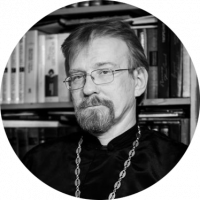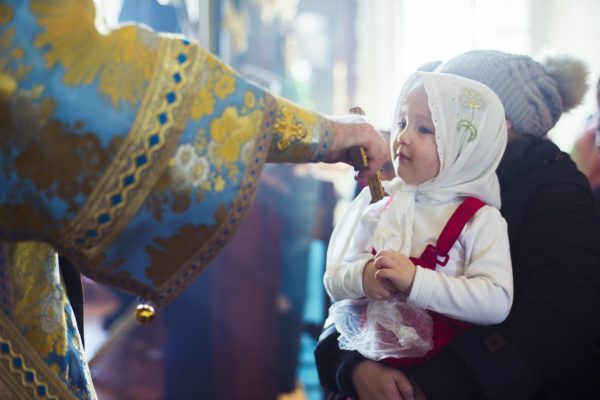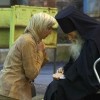– Is it true that the Church is going through tough times, and that being a Christian is harder today?
– I would like to reassure those who, reflecting on the state of the Church, believe that

Father Sergei Kruglov
everything is bad, everything deteriorates in comparison to some “golden age” of the past. A man, a person of any culture, be it a metropolis or rural culture, a Soviet, or post-Soviet, or pre-revolutionary culture, experiences hardships at any point in history. A person thinks that their difficulties and problems are the hardest due to their weakness, to the narrowness of their worldview. Today, however, being a Christian is no more difficult than at any other time, in any other place, the East or the West.
When exactly did Christians have no difficulties – in modern times, in the Middle Ages, in the first centuries? Just look at the books on the history of the Church, or re-read Acts of the Apostles and the epistles of the Apostle Paul to see it…
– Christians should love one another, is there such love today?
– There are wonderful people all around us. To see them, however, one has to, first, be a wonderful person themselves. As our Teacher said: “When thine eye is single…” (Luke 11:34). If we alter our view of the world, if we stop looking at one another each from behind their own gun, each through their own scope, then we will see what love is. Where did it disappear?
– Sometimes, however, you listen to people’s conversations or open social networks – and it becomes scary.
– This is another matter. The matter of diseases that plague modern society and modern man. Diseases and epidemics of different centuries are different. There were times when, for example, the plague, or cholera, or some other disease took hold of the nations. As some diseases were seemingly defeated, the other diseases came.
Today’s disease is the one of despondency, and it has somatic issues among its symptoms: clinical depression, immunity deterioration, mental diseases, which both children and adults are susceptible to. Therefore, in view of this disease people think that everything is exhausted, that there truly is nothing good in life, there is no love, and so on. Nevertheless, this is just a talk of a disease that has taken hold of people.
– Christians live in a society that is extremely divided after all. Can the idea of Christianity, of Orthodoxy serve to unite people?
– Of course, people have always been divided; there were always wars, clashes of opinions, of ideologies and so on. It exists today as well, in the post-Christian space, especially since this space is multicultural.
Even now, it is impossible to think of a new idea for uniting people, except perhaps the most primitive ones, those that lie at the base of Maslow’s pyramid. It seems that people are already tired of all the ideas; they have tried everything and have learned it the hard way, that nothing will work out anyways. “What do you say? Christianity? We have already tried to build a Christian government, a Christian society upon it, and nothing has worked out.”
If you take a look from the outside, our time is very strange. On the one hand, this is the time of the utmost disunity of people. On the other hand, it is as if some kind of mixer is at work, trying to unite them all, and it is not without reason that the genre of dystopia remains one of the most popular in films and literature…
It seems to me that one of the main ideas of the Antichrist, at least among other ideas, will be this: Christ, Christianity, the Church – we have already been through it.
The Antichrist will likely not even fight with Christ, he will simply push the Church aside as some ridiculous old rudimentary idea, and alas, many will agree with him.
Nevertheless, the need for God incarnate and love was, is and will be the most basic in a man, more basic than all others, it is embedded in us by the Creator. In this sense, I believe in God, in all that He has done and is doing, and I believe in people.
– But since our country positions itself as Orthodox, can the whole state suddenly become Christian?
– Regarding the position of our country, we know from history that the concept of a “Christian state” is an oxymoron, don’t we? The kingdom of Christ and the kingdom of Caesar are two different kingdoms, and they have different laws.
“But seek ye first the kingdom of God, and His righteousness” (Matt. 6:33). Or, seek ye the kingdom of Caesar and his righteousness. The righteousness of the kingdom of God is one, and the righteousness of the kingdom of Caesar is the other… We are born and live in the kingdom of Caesar, so there is no evading his truth, but eventually, a Christian who follows Christ in life, comes into conflict with this Caesarian righteousness. How does he or she resolve this conflict for themselves is a different question…
As history has demonstrated, there is no ideal Orthodox Christian government. The fact that the country positions itself as the Orthodox may end soon enough, may end tomorrow, should some certain people of power lose interest in Orthodoxy, in Orthodox ideology.
We already had the same thing; there was 1917, after all.
– Every morning we say: “We believe also in only One, Universal, Apostolic Church.” Having the situation with the Patriarchate of Constantinople, however, it is difficult not to start thinking which One Church it is.
– You need to think of such things. In particular, look for the answer to the question: what is the Church after all? If Christ the Lord Himself created it, how many and what churches did He create? What are the main features , without which the Church would cease to be the Church, and which are secondary after all, does the Church have borders, and if so, where are those borders?
I reckon it is as difficult to define what the Church is, as it is difficult to define a person. Still, it is necessary. In disputes about the Church, everyone sees their own: one sees an earthly organization with its own hierarchy, politics, and the malice of this day, another sees a mystical unworldly unity of people in Christ, the third sees a complex of ethical, cultural, and other ideas, the fourth — a safe haven, a family, where the children who had suffered wondering around the world finally find the Father, the fifth sees an ethnographic reserve, and so on.
Those who argue about the Church often argue in different languages, living as if in different dimensions, without noticing it.
Had they established what exactly they understand by the Church before the start, I think half of the disputes would disappear, and instead of a dispute or of two monologues sounding in mutual deafness, a dialogue would be possible…
– It kind of hurts, however, that here you can take communion, but you can’t do it there.
– Yes, of course, the news of the break in the Eucharistic interaction with Constantinople, of the sad events in Ukraine, was painful for many believers.
Of course, this is of vital importance for someone who lives abroad and has long been associated with parishes under Constantinople jurisdiction, but it is just an empty reason for gossips for the others, sort of like the terrified lady in a saying: “How am I supposed to take Communion on Mount Athos now?” (the joke, by the way, is not out of the air; I for one was approached with this particular question). Such questions, however – what should this or that particular parishioner do, can one continue with that Orthodox community which they have been with for many years and which for some reason have now been declared dubious, and so on – cannot be answered generically and unfoundedly, for each separate situation is unique.
I think about it this way: if you approached the Chalice together with these people and in this church, if you prayed to build the Eucharist together with them and with the priest, if you do not doubt the real presence of Christ among you, if your life was genuine in this Church, then this living presence of Christ, this evangelical impartiality and simplicity will help you overcome the heavy temptation, which, I hope, will pass sooner or later, because it cannot last forever. Trust Christ, He will lead you out.
It is sad, very sad indeed, that splits occur, but I will say it once more: they are not at all surprising; alas, splits in the Church have always happened, because sin, boiling passions and immaturity of mind and heart are inherent in all the people in a fallen, sick world. But there is still future ahead, so be patient. Be patient, and eschew evil. “Eschew evil, and do good” (1 Peter 3:11). See, it does not say: destroy evil (even more so “the evil ones”), but eschew it, do not negotiate with it, rather go and do some good.
Let those who create discords in the Church for their political purposes do what they want, they will reap what they sew, and we will neither discuss nor condemn, we will simply not go there. We will not turn a blind eye to sin either, we will not pretend that there is no sin – we will simply learn from the sinners not to do as they do, not to breed discord, but rather try to follow Christ’s covenant in our own lives: “Therefore if thou bring thy gift to the altar, and there rememberest that thy brother hath ought against thee; leave there thy gift before the altar, and go thy way; first be reconciled to thy brother, and then come and offer thy gift.” (Matt. 5:23).
I will say it once more: do not demand and idly wait for the hierarchs and politicians to stop the split – but do the gospel in your own lives. There is and will be no other way to resist evil except through one’s own self.
– What does it mean to be a friend of Christ? An ordinary person, just getting by, bouncing around, how can they become His friends?
– I do not know. There are no general recipes. It is necessary to wish for it to begin with… Here, however, we enter the realm of the mystery of the human person, which is no less great than the mystery of God. Where does this desire come from in a person, why do they suddenly become passionate about Christ? I only know that this happens.
Even now, Church lives, because Christians live.
– How should the Church respond to criticism?
– The church should respond clearly, openly, simply, calmly. Having thoroughly prayed to God prior.
When people ask: “What does the Church say on this or that matter?” they should remember that the Church has different institutions, different interests, different people, different speakers, ones being more famous than others. It is often the bright figures who are paid attention to, and widely broadcasted statements.
The Church, however, also communicates with the society at the level of a father and a parishioner, and this very communication between the father and the parishioner in some distant parish is no less important, perhaps even more important than the official comment of a well-known church speaker talking on some official matter.
There is a sensible criticism, a criticism with love, and it is the one most likely coming from church people who care about the fate of the Church. Such criticism is of the desire to help, the desire to cure certain sores.
– What do you think is the main problem of the Church now?
– The true problems are always the same – they concern Christ and man. All those we face in the loneliness of our everyday life. How to preserve faith? How to live to see Christ? How not to lose the joy of life, if it exists at all, and what does it imply? What should we do with the neighbors who need to be loved? How to love them when they are all nasty, to love them – and, first of all, ourselves?
– What should modern sermon be like?
– If sermon is a tool for some selfish purpose, a tool to bring a person to the Church, to manipulate them “in the name of”, then society has clearly long been tired of such a sermon.
Apart from the verbal one, there is another crucial type of sermon – non-verbal: live with Christ yourself, infect others with your faith verve.
It is in this sense that sometimes there is a feeling that the Gospel has not yet been preached to the world…
–Sometimes you meet stories of people who are disillusioned with the Church… What holds you in it?
And what keeps a person in life in general, in life with so many disappointments, sins and injustice, with shattered dreams and unfulfilled hopes? Some do not make it through and “return their ticket to God”, and the others continue to love life, no matter what… Why so? It is a mystery. Man is a great mystery. And man is not alone in this mystery, for Christ is with man, always and everywhere.
An abridged translation by Kirill Nikolaev.

















